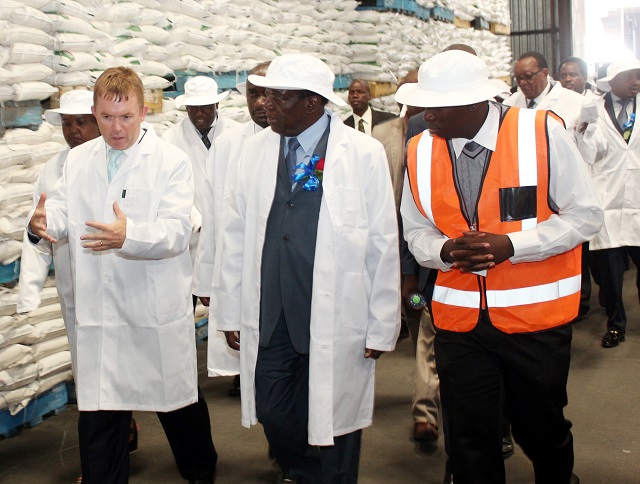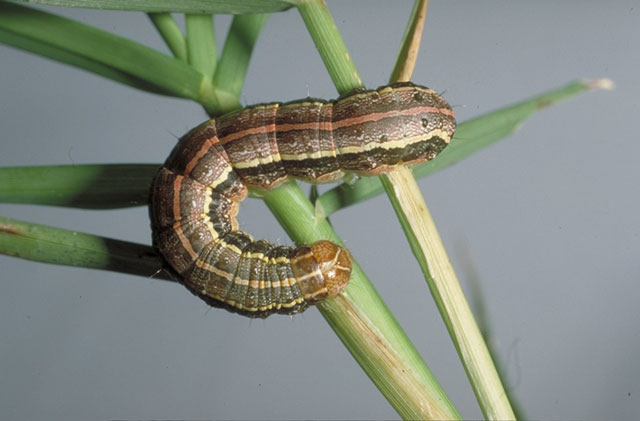‘Zim will not fail’. . . Voluntary subscription foolproofs command agric, VP says


National Foods chief executive officer Mr Michael Lashbrook leads Acting President Emmerson Mnangagwa on a tour of the company while the technical executive, maize milling, Mr William Kapfupi listens in Bulawayo yesterday
Prosper Ndlovu, Business Editor
ACTING President Emmerson Mnangagwa yesterday described as “absolute nonsense” views that the Government’s command agriculture scheme would fail, saying the local model was unique from what other countries have done.
Addressing business executives during a tour of milling companies in Bulawayo, the Acting President said overwhelming private sector input of up to $500 million and voluntary subscription by farmers to the programme, were sufficient testimony of its success.
“When we started the concept and idea of command agriculture, it is not the same with command agriculture, which the Press talks about. They are talking about command agriculture having failed elsewhere and think it will fail here. That is absolute nonsense. It won’t fail, it will succeed,” he told the gathering.
“The difference is that our command agriculture is constructed on the backdrop of free and voluntary participation. We don’t go around the country and say ‘you must join the command agriculture’. No! Initially we had that idea because we wanted two million metric tonnes produced every season as that is adequate for our food supply in our country.”
The Acting President said the private sector and stakeholders in the food industry — the millers, seed companies, fertiliser and chemical companies, farmers’ unions, the banking sector — have thrown their full weight behind the scheme and provided the required resources to ensure its success.
“We had no cent at all when we conceived the idea and we said now where do we get the money? We got it from that stakeholder conference that we held. So, we are financing it domestically, nothing is coming from outside the country, we are so happy,” said the Acting President.
Zimbabwe consumes about 1,5 million tonnes of maize annually and the Acting President said the country also needs to have half-a-million tonnes in strategic reserves in the silos, which makes two million tonnes.
“So, initially we said how many farmers could we have to produce that and we worked out and said if we had 2 000 farmers, each one producing on 200ha, we would produce what we want if we supported them fully. But we said how do we identify the 2 000 farmers?
“That was going to be discriminatory. Who would come on and who would not? So we cancelled that idea and said how many hectares would produce that (two million target) instead of people and we came to the conclusion of 400 000 ha,” he explained.
It was on this basis that Government invited those keen to participate to do so.
“So people have voluntarily come to this scheme or programme but it remains command because once you come we support you on conditions that it is cost- recovery,” he said.
Acting President Mnangagwa said the milling industry had already agreed to come on board and pledged to buy 800 000 of the targeted two million tonnes .
He said the gesture would reduce the burden on Treasury, which has to source funding to absorb the remainder of the produce.
“So, you can see how our people can come forward to grow our economy if we dialogue,” said the Acting President.
Having seen the success of the programme so far, he said the command agriculture model would be extended to soya bean production where he hoped funding would also come from local sponsors who stand to benefit from the produce.
At the moment Zimbabwe relies on soya bean imports, which drain the scarce foreign exchange resources and increase the import bill.
The Acting President said a similar model would also be rolled out on wheat, tobacco and cotton as well as livestock production.
He said once agriculture takes off it will impact positively on the entire economic spectrum of the country including beneficiation, value addition, employment, downstream industry and technology with other sectors of the economy responding accordingly.
The Acting President visited United Milling (Private) Limited, National Foods and Blue Ribbon Foods where he expressed satisfaction with the production capacity and investment directed at improving output.
He commended the contract farming deals that the agro-processing firms had entered into with farmers saying such a model would increase output and yields.
The Acting President assured the industry captains that Government would continue to support their operations through creating an enabling environment and crafting supporting legislation.
Cabinet Ministers — Retired Colonel Tshinga Dube (War Veterans), Dr Joseph Made (Agriculture), who is acting Minister of Industry and Commerce, Grain Millers’ Association of Zimbabwe chairman Mr Tafadzwa Musarara and his executive, Bulawayo MPs and business leaders also took part in the tour.











Comments